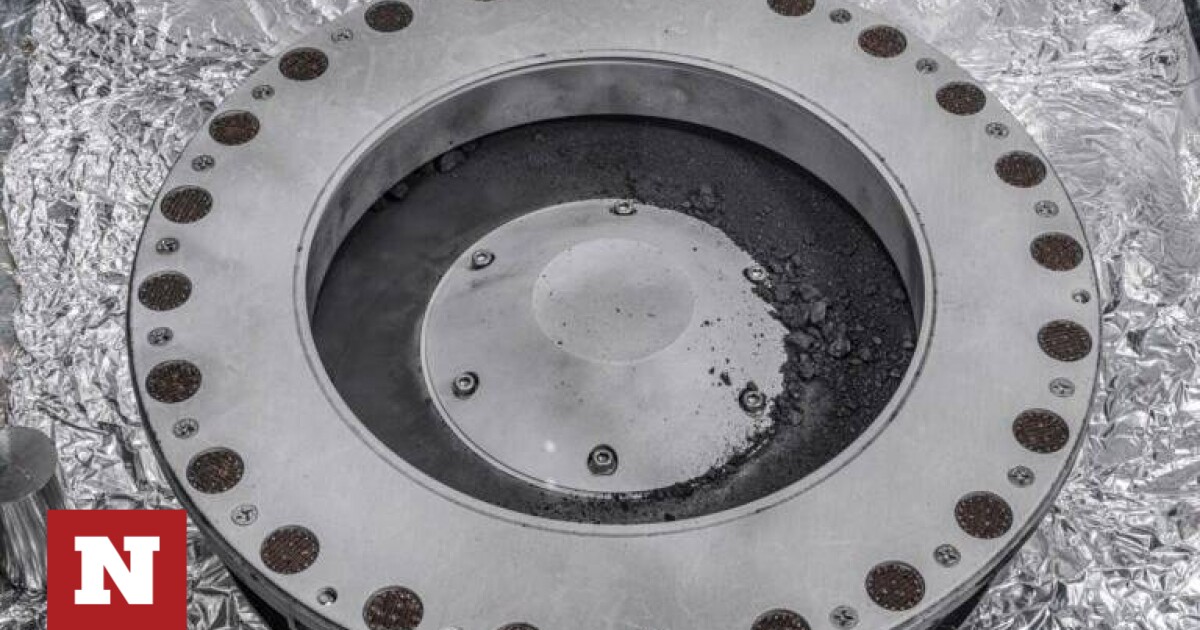
The OSIRIS-REx sample is the largest sample of a carbon-rich asteroid ever delivered to Earth
NASA announced from the Johnson Space Center in Houston the first analyzes conducted on the asteroid He specifies For the first time since its sample landed last September, ertnews.gr reported
the Preliminary studies From the asteroid’s age sample 4.5 billion years They were collected in space and brought to Earth by NASA Shows evidence of high carbon and water contentwhich together can indicate that The building blocks of life on Earth can be found in rocks
This discovery was part of a Initial evaluation From the scientific team Osiris Rex (Origins, Spectral Interpretation, Resource Identification and Security – Regolith Explorer) by NASA.
“We will see science that we have never seen before.”
“The OSIRIS-REx sample is the largest sample of a carbon-rich asteroid ever delivered to Earth It will help scientists investigate it The origin of life on our planet for future generationsNASA Administrator Bill Nelson said. “Almost everything we do at NASA seeks an answer Questions on Who we are and where we come from. NASA missions like OSIRIS-REx will improve it Understanding asteroids That could threaten Earth, while They will give us a glimpse into what lies behind it. “The sample has returned to Earth, but there is still a lot of science to come – science we have never seen before.”
Although it is necessary More work To understand the nature of existing carbon compounds, the initial discovery holds promise Future analyzes of the asteroid sample. The secrets hidden within asteroid rocks and dust will be studied for decades to come, providing insight into how our solar system formed, and how Precursors of life What precautions should be taken to avoid asteroids colliding with our planet?
How do scientists examine the sample?
The objective of OSIRIS-REx sample collection was to: 60 grams of asteroid material. NASA Johnson experts, working in new cleanrooms designed specifically for the mission, have so far spent 10 days carefully disassembling the spacecraft. Sample return material to identify the sample inside. When the science canister’s lid was first opened, scientists discovered “extra” asteroid material covering the outside of the collector’s head and the canister’s lid and base. There was a lot of extra material which slowed down the delicate process of collecting and retaining the initial sample.
During the first two weeks, scientists conducted “at-a-glance” analyzes of this raw material by collecting images from a scanning electron microscope, Infrared measurements, X-ray diffraction and stoichiometric analysis. X-ray computed tomography was also used to produce a 3D computer model of one of the particles, revealing its internal diversity. This early glimpse provided evidence of abundant carbon and water in the sample.
Over the next two years, The mission’s science team will continue to characterize samples and perform analyzes required to achieve the mission’s scientific objectives. NASA will retain at least 70% of the sample at Johnson for further research by scientists around the world, including future generations of scientists. As part of the OSIRIS-REx science program, a team of more than 200 scientists from around the world will investigate the properties of the regolith, including researchers from several US institutions and NASA partners JAXA (Japan Aerospace Exploration Agency), and CSA (Canadian Space Agency). ) and other scholars from all over the world. Additional samples will also be loaned later this fall to the Smithsonian Institution, Space Center in Houston and the University of Arizona for public display.

“Total alcohol fanatic. Coffee junkie. Amateur twitter evangelist. Wannabe zombie enthusiast.”





More Stories
Is this what the PS5 Pro will look like? (Image)
Finally, Windows 11 24H2 update significantly boosts AMD Ryzen – Windows 11 performance
Heart Surgeon Reveals The 4 Things He ‘Totally Avoids’ In His Life